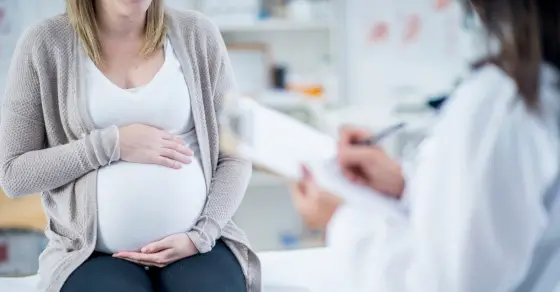A new study examining more than 18,000 babies has found something deeply concerning: COVID-19 infection during pregnancy may increase the risk of developmental disorders — including autism — in children.
This research, published in the journal Obstetrics & Gynecology by Mass General Brigham (MGB), is one of the largest studies to date to look at how maternal COVID infection impacts a child’s brain and neurological development.
The findings suggest that while most babies born to infected mothers are healthy, there’s a measurable rise in the risk of developmental challenges by age three.
What the Study Found
The study analyzed data from 18,124 live births between March 2020 and May 2021 across the Mass General Brigham hospital network.
Out of these:
- 861 babies were born to mothers who had tested positive for COVID-19 during pregnancy.
- 17,263 babies were born to mothers who did not test positive.
By the time the children reached age 3:
- 16.3% of those exposed to COVID in the womb had at least one neurodevelopmental diagnosis — such as autism spectrum disorder, speech delay, or motor delay.
- In comparison, only 9.7% of the unexposed group had such diagnoses.
After adjusting for other factors like age, race, insurance type, and preterm birth, researchers found that maternal COVID infection was associated with a 29% higher risk of neurodevelopmental disorders (adjusted odds ratio 1.29; 95% CI 1.05–1.57).
They also found that third-trimester infections carried a slightly higher risk (aOR 1.36), and male babies were more affected than females (aOR 1.43).
In other words, children born to mothers who had COVID while pregnant were significantly more likely to be diagnosed with developmental delays or autism by the age of three.
What It Means (and Doesn’t Mean)
Before panic sets in, let’s be clear:
This study shows an association, not proof of cause and effect.
It doesn’t mean that every child born to a COVID-positive mother will develop a neurological condition — not even close.
But it does suggest that COVID infection during pregnancy may slightly increase the risk — and it’s something every expecting parent and healthcare provider should be aware of.
Researchers suspect that maternal inflammation could play a major role.
When a mother’s immune system reacts to an infection, the resulting inflammatory response may affect the placenta or disrupt delicate stages of fetal brain development. This is known as maternal immune activation, and it’s been linked in past studies to higher rates of autism and developmental disorders after infections like influenza and Zika.
Why These Findings Matter
Pregnancy has always been a sensitive period — and infections during pregnancy can sometimes have lifelong impacts on the child.
What’s new here is that this large-scale study provides real-world data on how COVID-19 specifically may be influencing early brain development.
Here are a few reasons this research matters:
- Early detection and intervention: Knowing that COVID exposure in pregnancy might slightly raise risk allows pediatricians to monitor early milestones more closely.
- Informed prevention: Pregnant women can take extra care to avoid infection and reduce inflammation during pregnancy.
- Public health awareness: This helps shape policies for protecting pregnant women during pandemics.
What Experts Say
Dr. Andrea Edlow, the senior author of the study and a maternal-fetal medicine specialist at MGB, stated:
“The overall risk to any individual child remains low, but these findings highlight the importance of infection prevention during pregnancy.”
Independent experts have echoed that sentiment — urging awareness but not alarm.
The goal isn’t to create fear, but to help parents and doctors recognize the value of early developmental screening and prenatal health.
The Study’s Limitations
Like all research, this study has some limits:
- Timing: It looked at pregnancies from early in the pandemic (March 2020–May 2021), before widespread vaccination and with earlier virus variants.
- Confounding factors: Maternal health conditions such as obesity, diabetes, or stress — which can affect both COVID risk and development — weren’t fully separated.
- Short follow-up: The children were only tracked until age three; longer-term outcomes are still unknown.
- Diagnosis bias: Children whose mothers had COVID may have been more closely monitored, increasing the likelihood of early diagnoses.
So, while this is compelling data, it’s still one piece of a larger scientific puzzle.
What Pregnant Women Can Do
If you’re pregnant or planning to be, this study underscores one clear truth — protecting your body from infection protects your baby’s development, too.
Here’s what you can do:
1. Reduce Infection Risk
- Avoid close contact with anyone showing symptoms of illness.
- Wash hands often and avoid unnecessary crowded environments.
- Discuss COVID-19 vaccination and boosters with your healthcare provider — multiple studies show vaccination during pregnancy reduces severe illness and improves outcomes for both mom and baby.
2. Support Your Immune and Nervous System Naturally
- Eat a nutrient-dense diet rich in antioxidants and anti-inflammatory foods (like leafy greens, omega-3s, berries, and lean proteins).
- Take prenatal vitamins as recommended by your doctor.
- Prioritize sleep and stress reduction — chronic stress can heighten inflammation.
- Gentle exercise and prenatal yoga can support healthy circulation and mood.
3. Monitor Your Child’s Development
If you had COVID during pregnancy, be proactive about tracking developmental milestones after birth.
Watch for:
- Speech or motor delays
- Lack of eye contact or responsiveness
- Behavioral or social differences
If you notice any concerns, bring them up early with your pediatrician. Early intervention can make an enormous difference.
The Possible Biological Link
Scientists have a few theories on how COVID-19 might influence brain development in the womb:
- Maternal inflammation: Immune responses release cytokines that can alter brain formation in the fetus.
- Placental changes: COVID can affect blood flow or oxygen exchange between mother and baby.
- Stress response: Maternal stress hormones can affect fetal neural wiring.
- Gender difference: Male fetuses seem more vulnerable to prenatal inflammation, consistent with what this study found.
These are still theories, but they fit with past evidence from other infections and inflammatory conditions.
The Takeaway
The Mass General Brigham study doesn’t mean every COVID-positive pregnancy will lead to autism or developmental issues.
But it does highlight the importance of vigilance, prevention, and early care.
The numbers tell the story clearly:
- 9.7% baseline risk vs. 16.3% among those exposed to COVID.
- That’s roughly a 29% higher likelihood of neurodevelopmental diagnosis by age three.
It’s not about panic — it’s about awareness.
Pregnancy is a delicate balance between the mother’s body and the developing child. Supporting the immune system, reducing inflammation, and staying healthy can go a long way toward protecting that balance.
What This Means for the Future
This study is one of the first to link COVID-19 in pregnancy with measurable developmental effects in children. But it likely won’t be the last.
Future research will explore:
- How different variants and vaccine timing change these risks.
- Whether postnatal environment or interventions can reverse early effects.
- The long-term outcomes beyond early childhood.
For now, the message is simple: care for the mother, protect the child.
If you’re pregnant or planning to be, now is the time to focus on immune strength, prevention, and prenatal health.
The choices made today can echo for a lifetime.
References:
- Shook, L.L. et al. Neurodevelopmental Outcomes of 3-Year-Old Children Exposed to Maternal SARS-CoV-2 Infection In Utero. Obstetrics & Gynecology. 2025.
- Mass General Brigham Press Release.
- Harvard Medical School & CIDRAP coverage summaries.
- U.S. Right to Know, Washington Post, and People Health reports.




